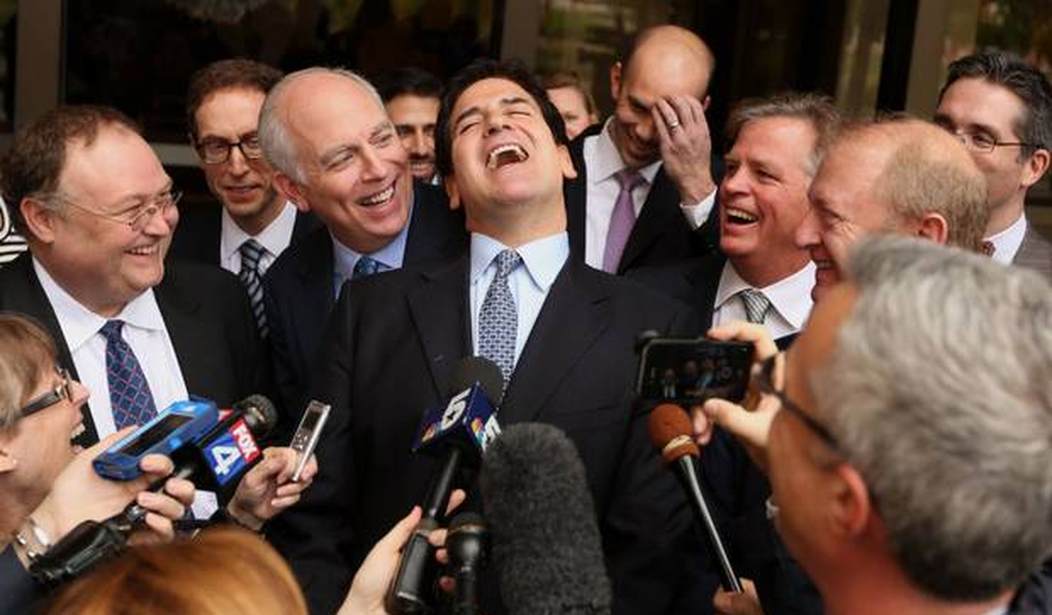 The existential threat to our way of life is not terrorism or nuclear holocaust, it is the metastatic growth of the regulatory state. One of the legacies of the New Deal is the proliferation of agencies composed of unelected busy bodies who have two overweening ambitions: controlling the lives of their fellow citizens and the aggrandizement of power to their agency. The second great threat is the unchecked militarization of our law enforcement organizations but that is a story for different day.
The existential threat to our way of life is not terrorism or nuclear holocaust, it is the metastatic growth of the regulatory state. One of the legacies of the New Deal is the proliferation of agencies composed of unelected busy bodies who have two overweening ambitions: controlling the lives of their fellow citizens and the aggrandizement of power to their agency. The second great threat is the unchecked militarization of our law enforcement organizations but that is a story for different day.
Whenever someone stands up to this low level fascism, regardless of personal foibles they become a hero in my book. Such a man is the rather erratic billionaire, Mark Cuban.
Over time, as detailed in this Wall Street Journal article by Cuban’s attorney, Lyle Roberts, the Security and Exchange Commission have succeeded in criminalizing knowledge:
Contrary to a popular misconception about insider trading, there is nothing wrong with a person trading on the basis of nonpublic information about a corporation.
An entire profession—the stock market analyst—is predicated on the idea that investors can and should seek an informational advantage to better manage their investments. Trading based on an informational advantage is only illegal when it results in a fraud, and that only happens in certain narrow circumstances.
In the classic case of illegal insider trading, where a corporate insider trades on material, nonpublic information about the company for his own benefit, this fraud requirement is easily satisfied. The insider owes a fiduciary duty to his company’s owners, the shareholders, which he fraudulently violates when he trades (or deliberately tells someone else so that they can trade) without disclosing to the market the existence of the information.
Where things get tricky, however, is when the trader is not a corporate insider. What if someone is just told (or overhears on an elevator or in the subway) material, nonpublic information about a company? If he proceeds to trade on the information, his liability under insider trading rules turns on whether he has breached a fiduciary or similar duty of trust and confidence he owed to the source of the information (this is called the “misappropriation theory”).
The original idea here was to prevent an attorney, for example, from obtaining information from a client and using it for his own benefit to trade stock. The way the SEC has applied the misappropriation theory, however, deliberately blurs the lines in an overzealous attempt to regulate “unfairness.”
The agency began in 2000 by creating a regulatory rule (Rule 10b5-2) designed to address how the misappropriation theory could be extended to exchanges of information between friends or family members. Under the rule, the required duty of trust and confidence is formed any time a friend or family member formally agrees to keep the information confidential.
Soon thereafter, however, the SEC began citing Rule 10b5-2 in courts across the country as applying whenever any material, nonpublic information is exchanged and the recipient, regardless of whether he is a friend or family member, formally agrees to keep the information confidential. Recently, the SEC abandoned even that broad standard and essentially has argued that a wink and a nod (or even silence) to confidentiality when material, nonpublic information is shared is sufficient to hold anyone who trades on that information liable for insider trading.
Cuban was charged by the SEC with insider trading and offered a deal, he could pay a $2 million fine and the matter would go away. That’s a nice life you have there, Mr. Cuban, it would be a shame if anything happened to it.
Cuban refused and went to trial.
This matter, which has been pending before the Commission for nearly two years, has no merit and is a product of gross abuse of prosecutorial discretion. Mr. Cuban intends to contest the allegations and to demonstrate that the Commission’s claims are infected by the misconduct of the staff of its Enforcement Division.
Mr. Cuban stated, “I am disappointed that the Commission chose to bring this case based upon its Enforcement staff’s win-at-any-cost ambitions. The staff’s process was result-oriented, facts be damned. The government’s claims are false and they will be proven to be so.”
The details of the accusation and trial aren’t germane here, but if you are interested Professor Stephen Bainbridge has a very good round up at Mark Cuban Acquitted of Insider Trading.
Mr. Cuban spent $12 million of his own money to avoid a $2 million fine and was acquitted. At a press conference held after his acquittal he was not happy (the transcript is worth reading). He took the prosecutors to task, by name, for their actions.
There were people on their side saying ‘look, it’s only business, it’s not personal.’ Janet Folina is like ‘hey, this is only business, I’m just here to litigate,’ Dwayne was like ‘hey, tell your friend Charlie that it wasn’t personal, it’s just business.’ It’s personal! When you put someone on the stand and accuse them of being a liar, it’s personal. Right? When you take all these years of my life, and try to prove a point, it’s personal. And to try and play off like this is just your job? Again, I don’t want to say that’s the way all the SEC works, but the people who were in this case could have said something, and didn’t say anything, and that’s just wrong.
[…]
When they mischaracterize the facts. When they did everything to hide the facts, and not bring out the facts. That’s just wrong. And someone’s got to stand up and do that…and like I sad, when this started I won’t be bullied. I don’t care if this is the United States Government. And I don’t (sic) win anything today, I just got started today.
What Mark Cuban meant by that has become very clear in recent days. He wants to meet with SEC Chairman Mary Jo White (who appears to be Moe Howard’s long lost sister) about how the SEC enforces financial laws:
But the owner of the NBA’s Dallas Mavericks won’t let it rest. Cuban, who has racked up $1.89 million in fines for his sideline outbursts, is expert at goading his adversaries. Never one to hold his tongue, he’s been using his blog, Twitter and the news media to beat up on the SEC for its handling of the case. The public showdown pits the eccentric billionaire against a buttoned-down agency that has been taken aback by the unusually acrimonious and personal nature of the attacks.
For the SEC, going after a celebrity has a high payoff — if it wins. Unlike cases tried out of the spotlight, the verdict in a well-publicized case typically reaches beyond the defendants, creating a deterrent by showing that no one is above the law, agency officials say. That said, as Cuban has demonstrated, a loss can pose a public relations nightmare.
Cuban said he is trying to get a face-to-face meeting with White and hopes to discuss how his ordeal can inform the SEC’s work. He said the agency measures success by its courtroom wins and losses without assessing whether these legal battles boost investor confidence or improve market fairness.
[…]
In post-trial interviews, Cuban has bashed the SEC for eating up years of his life, and plenty of his cash, in an effort to find him liable on bogus charges. He says he rebuffed a $2 million settlement and paid $12 million in legal fees to defend himself.
But it gets better. He is also holding the attorneys in the case to account for their conduct:
Cuban said he wants to hold the SEC attorneys accountable for his ordeal, which is why he’s naming names and focusing on not just the appointed head of the agency, but the career lawyers who faced off against him in court. On “Leno,” he said there were good people at the SEC, but not Jan Folena, the agency’s lead attorney in his case. “F-O-L-E-N-A,” he told the audience. Linda Thomsen, the SEC’s enforcement chief at the time, may have targeted him because “she was just desperate for a skin on the wall,” he told USA Today.
Thomsen, now in private practice, did not respond to calls requesting a comment. Folena declined to comment for this article.
Immediately after the jury’s verdict, the SEC said Cuban’s remarks were “without merit and uncalled for.” The agency’s legal team “acted in the finest traditions of government counsel and entirely appropriately,” George Canellos, the SEC’s co-director of enforcement, said in a statement.
[…]
Others say Cuban is misguided in taking on specific attorneys.
“Jan Folena is not the policymaker,” said Bradley J. Bondi, a former counsel to two SEC commissioners and now a lawyer at Cadwalader, Wickersham & Taft. “She did not decide to pursue this case. She was asked to try the case by her supervisors in the trial unit, and the trial unit was directed to try this case by the commission.”
Most of us thought the “I was only following orders” defense became passé sometime in 1946. When you participate in an unjust act you don’t get a pass just because you were told to do it. You own the action. During the government shutdown in October I wrote about the petty bureaucrats who seem to believe they get a pass because they aren’t making policy (see The Little Eichmanns of the Government Shutdown). The same applies, but in much stronger terms, to people who are seeking to deprive their fellow citizens of life, liberty, and property for no greater purpose than making a newspaper headline.
In a just world, Mary Jo White and her merry band of mindless drones would learn a lesson from this. They would resolve to treat future suspects with the respect humans are expected to extend to one another and err on the side of not prosecuting, remembering the adage from Blackstone that it is better that ten guilty men go free than one innocent man suffer. A religious man might consult the exchange between God and Abraham before Sodom and Gomorrah were nuked in Genesis.
But this is not a just world. And we are lucky that there are rich men who are able to do what the rest of us are unable to do.













Join the conversation as a VIP Member